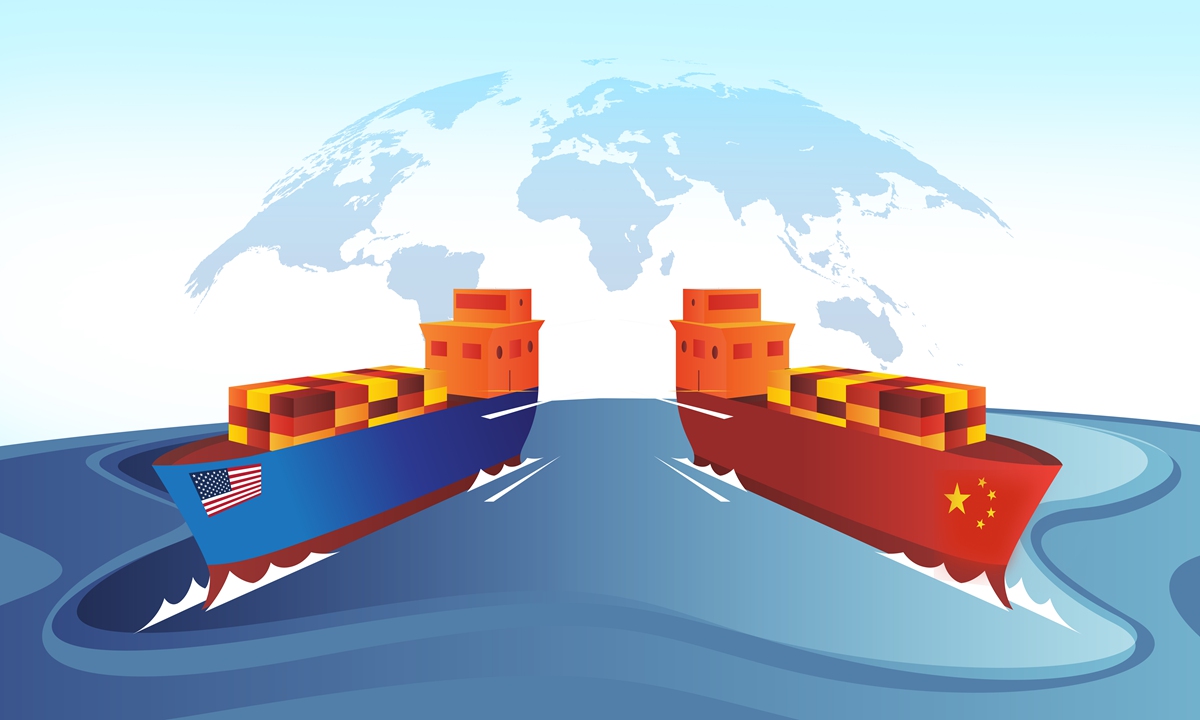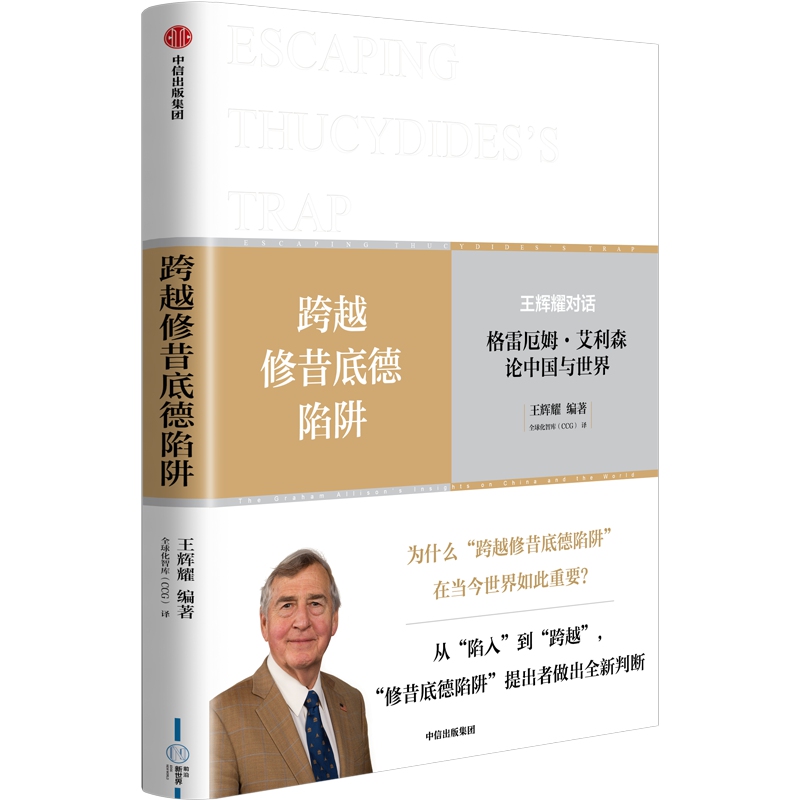
China-US Graphic: GT
Editor's Note:
Occasionally, human beings are born as inseparable, conjoined Siamese twins. There are two heads, but they have the same nervous or gastrointestinal system. If either of them were to strangle the other, they commit suicide - this is how Graham Allison (
Allison) describes China-US relations in an exclusive interview with Global Times (
GT) reporters Li Aixin, Xue Ke and Niu Yingbo. During his recent trip to Beijing, Allison, Douglas Dillon Professor of Government at Harvard University, met with a series of government officials and scholars, and attended President Xi Jinping's meeting with representatives from the US business, strategic and academic communities on March 27. The Chinese leadership has risen to the conceptual challenge of Thucydides' Trap, and is prepared to be intellectually courageous in trying to deal with it, he said.
GT: What impressed you during your meeting with President Xi?
Allison: Throughout the whole discussion with President Xi, he was very candid, engaging and friendly. He seemed relaxed, comfortable and interested in engaging intellectually.
A few of us were asked to make small comments at the meeting. One of the comments I made was to congratulate both him and President Biden for their achievement at the San Francisco summit. But the most important thing about the San Francisco Summit was that two adult leaders, each of whom is seasoned and professional, met privately, quietly, for a very candid conversation about sensitive and dangerous issues. That's exactly what's required to have a foundation that we can build on for constructive relations.
I would say both President Xi and President Biden are capable and they demonstrate it by sitting down and having very adult conversations and even such successful conversations that you and I don't even know all the items on the agenda. That is one of the most important features of making sure we can manage the Thucydidian rivalry.
GT: As you mentioned, both leaders are cautious about the Thucydides' Trap. Somehow, we have been witnessing escalating tensions between the two countries in recent years. What has caused this contradictory phenomenon?
Allison: I think what President Xi and President Biden rightly understand is that China is a rapidly rising power that is determined to rise, to be all that it can be, and that the US is a colossal ruling power that believes it has created an international order in the period after World War II that has actually been good for everybody. It is a classic Thucydidian rivalry that sets up the same dynamic we've seen repeatedly over the course of history. That's inevitable.
What's not inevitable is that it ends in a war, as opposed to being managed in such a way that there's not a war. That's why it is so important that the parties realize what a big challenge they have, and that they work imaginatively to find a new form of great power relationship.
President Xi said in his conversations with US Senate Majority Leader Chuck Schumer in October, "I am in you and you are in me." For the US and China today, it means our survival requires a degree of cooperation. That's a big idea. For me to survive, I have to work with you. And for you to survive, you have to work with me. I believe it's true.
The metaphor that I use is, in biology, there's this phenomenon in which occasionally human beings are born as inseparable, conjoined Siamese twins. There are two heads. But they have the same nervous system or the same gastrointestinal system. If either of us were to strangle the other one, we commit suicide. That's pretty stabilizing, because I now have a stake in you and you have a stake in me.
Is that an accurate description of the conditions that the US and China face today? I think it is. We each have nuclear arsenals so robust that if either of us should attack the other in a full-scale nuclear war, we both die. That's a pretty powerful reason not to have a war and not to let some other event or accident or miscalculation drag us into a war, whether in the Taiwan Straits or something in the South China Sea or wherever.
It was very clear - not only in the conversation with President Xi but also with Foreign Minister Wang Yi - they are actively thinking about how we can escape Thucydides' Trap, and looking at examples in history, and ideas in philosophy.
They've risen to the conceptual challenge. Since I'm a professor and somebody from the strategic community, I admire leaders that are prepared to be intellectually courageous in trying to deal with the problems that we face.

Escaping Thucydides's Trap: Dialogue with Graham Allison on China-US Relations, launched on March 23 in Beijing. Photo: CITIC Press
GT: When you go back to the US, will you communicate these messages to the US side? And what kind of response from the US side would you anticipate?
Allison: I will, of course. Fortunately, many members of the current Biden team are former students, colleagues and friends, whom I talk to regularly. I will be happy to report my impressions and views.
We'll see (about the US response). San Francisco reflects very well the views of President Biden, his National Security Adviser Jake Sullivan, and Secretary of State Antony Blinken. If you look at the work that they did with Wang Yi before the meeting, and if you look at now, the working groups have been set up to try to resolve issues. Treasury Secretary Janet Yellen will visit here soon, and the climate discussion will be renewed. The secretary of commerce and her counterpart are having active conversations. They didn't simply agree to some rhetoric. They agreed to a beginning of a work plan, with a solid foundation. I think both countries are already on the right track.
GT: Let me ask about more specific issues where tensions are on the rise. The Taiwan Straits and the South China Sea, where do you think is more likely to become the next flashpoint? Observers are saying that if the US decides that fighting for Taiwan is not the way to go, then having the Philippines fight for the South China Sea would suit the US. Is that so?
Allison: In a Thucydidian rivalry, there are many potential flashpoints. That's always the case.
I would say Taiwan is the most sensitive flashpoint. The Chinese position about the Taiwan question is absolutely unambiguous. If new leader of Taiwan would declare Taiwan to be independent and try to be serious about that, or if the US were to support a Taiwan claim for independence, that would be highly likely to lead to a war between the US and China, which might well become a wider war, then a nuclear war.
Fortunately, Presidents Biden and Xi understand that very well and are determined not to let that happen. I am sure they must have talked about this. If you look at the behavior of both governments, since San Francisco, you can see that things have calmed down a bit. I take that as evidence that there's adult supervision.
In the case of the Philippines and the shoals, I'm not well informed about that. But from what I can see, there are risks because the Chinese view and that of the Philippines are quite different. The US has a thick and complicated relationship with the Philippines. I think there's a lot of work to be done in candid conversations about making sure that whatever the rivalry is about, it won't get out of control or lead to some potential escalation.
GT: Do you think there are enough China hands among the new generation of US scholars and politicians? Does the US have an interest in nurturing more China hands?
Allison: The answer is no, there are not enough Chinese hands, especially not enough who really understand China. There are people like me who are China watchers, but who don't speak Putonghua, and have never lived in the country for any period of time. I've read the history of it. I have talked to many Chinese and many Americans. I had the good fortune to have Lee Kuan Yew as my tutor to help me try to understand China as well as Henry Kissinger, my old professor.
But Henry didn't study China when he was young; when he was a professor, he didn't ever learn Putonghua. So we need to have a whole huge cadre of Americans who are studying in China and understanding China better.
Fortunately, this is not a new idea. The US Ambassador to China, Nicholas Burns, is trying to make sure he brings lots of the most talented young foreign service officers to have a chance to be part of this. There are now many excellent (US) students who go to Tsinghua, but not enough.
President Xi's idea is that there should be 50,000 Americans in the next five years studying in China. It is a great idea. I hope that's going to happen. Similarly on the Chinese side, there are many Chinese studying in the US, and many that study at Harvard. They need to come to my class. At both the people-to-people and the expert level, there's a danger from misunderstandings. People who have a deeper understanding of the two countries, the two cultures and the two histories, are more likely to find out how we can survive together.
GT: You brought up the issue of misunderstandings. What would you say is the West's biggest misunderstanding about China?
Allison: Too many people in the West, very simplistically, say this is the new cold war; China must be the Soviet Union; China must have ambitions to create revolutions around the world to take over other countries. That's wrong in every respect. China is not the Soviet Union. China is not pursuing an ideology or a policy of creating revolutions in other countries or attempting to send their troops there or to take over other countries. It makes no sense. But you'll still hear congressmen and other people making such claims. I would say that's a sign of ignorance.





